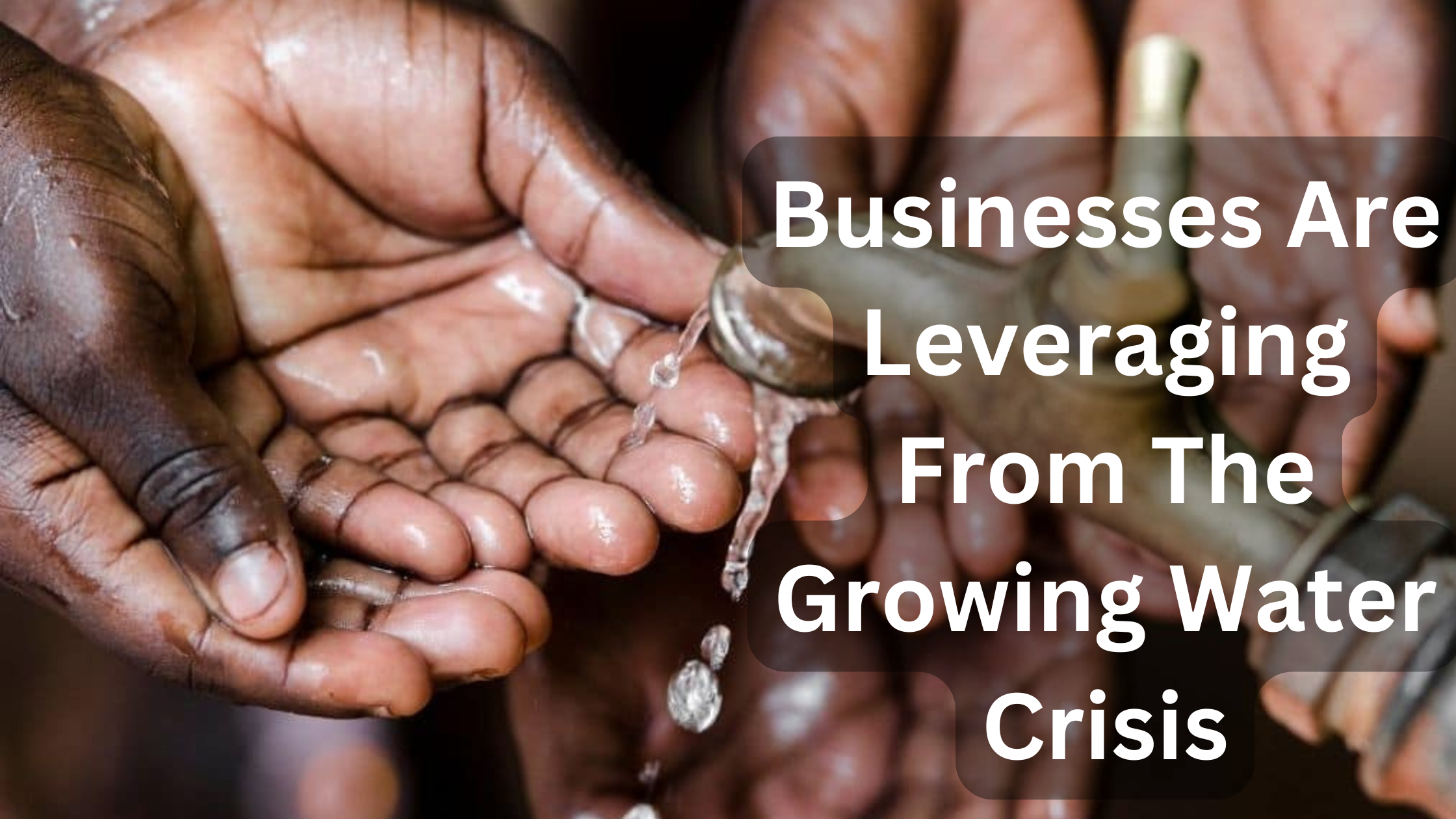Disclaimer
(This post is not intended to harm any corporation; these are simply facts based on information found, all over the Internet.)
Water Crisis: A Golden Egg for Large Businesses

As the global water situation worsens, huge corporations see tremendous prospects for expansion and profit. Businesses are capitalizing on the growing demand for water-related products and services, offering anything from novel water filtration technology to resource management systems. This article examines how these companies transform a global crisis into a profitable business opportunity.
Big Business Capitalising on Water Scarcity

The worldwide water issue, caused by climate change, population increase, and unsustainable consumption habits, is fast worsening. While the implications of the crisis are severe, many huge firms are discovering new chances for growth and profit. Businesses are capitalizing on the growing demand for water-related products and services, offering anything from novel water filtration technology to resource management systems.
A Historical Perspective on Water Scarcity.

Water scarcity while a severe concern now, is not a recent phenomenon. Throughout history, civilizations have encountered water-related issues.
- Ancient civilisations Mesopotamia:
The ancient Mesopotamian civilization, which existed between the Tigris and Euphrates rivers, relied significantly on these waterways for agriculture and drinking water. However, changes in river flow and saltiness of the soil caused periods of water scarcity.
- The Roman Empire
They built enormous aqueducts to convey water to cities and towns. However, these systems were prone to breakage and maintenance concerns, resulting in occasional water shortages.
- The Industrial Revolution
The Industrial Revolution caused considerable changes in water usage. Urbanization, industrialization, and agricultural intensification have all raised the demand for water supplies. This prompted the development of new technologies, such as water treatment plants and dams, to fulfill the increasing demand.
- The twentieth century
The twentieth century saw a steady growth in worldwide water use. Population increase, economic development, and shifts in farming practices all contributed to this trend. Furthermore, pollution and climate change began to have a substantial impact, on water quality and supply.
Current Water Crisis
Today, the globe is experiencing a water crisis of unparalleled magnitude. Climate change, population increase, and unsustainable consumption practices are causing water scarcity and pollution. Many regions are experiencing droughts, water shortages, and conflicts over water resources
The Future of Water
The water issue is expected to worsen during the next decade to twenty years. Climate change is anticipated to cause more frequent and severe droughts, increasing sea levels, and shifts in precipitation patterns. Population expansion and economic development will continue to raise water demand, while pollution and unsustainable land use practices will deteriorate water quality. To overcome these difficulties, we must implement sustainable water management techniques, invest in water infrastructure, and promote conservation. This will necessitate collaboration between governments, corporations, and communities on both the local and global levels.
Corporations profiting from water problems

Nestlé: The Controversial Case Nestlé is one of the most renowned corporations, to benefit from the water issue. The multinational food and beverage conglomerate has come under fire for its activities in nations with water scarcity, such as India and Pakistan. Nestlé has been accused of diminishing groundwater resources and selling bottled water at exorbitant costs to regions facing water shortages. While the company has defended its conduct, the scandal exposes the possibility for corporations to benefit from water-stressed communities.
United Utilities: This British water firm has made significant investments, in water infrastructure and technology, including improved metering systems and leak detection technologies. These initiatives have helped the corporation cut water losses and enhance efficiency, resulting in higher earnings.
Danone: The French food and beverage corporation has grown its water business by acquiring brands such as Evian and Volvic. Danone has established itself as a world leader in premium bottled water, focussing on consumers who are ready to pay a premium for high-quality, sustainable water.
General Electric (GE): has created a variety of water treatment technologies, including desalination plants and wastewater treatment systems. The company has been able to capitalise on the expanding demand for these solutions, particularly in water-scarce countries.
Deeper Dive into Corporate Profits During the Water Crisis
The Increasing Demand for Water Solutions
The worldwide water crisis is causing an increase in demand for innovative solutions. As water shortage increases, industries are investing in technologies that can Desalinate seawater: Countries with coastal access are using desalination plants to meet their water requirements.
Treat wastewater: Reusing treated wastewater in agriculture, industry, and even drinking water can assist to reduce water scarcity. Improve water efficiency using technologies such as smart irrigation systems and leak detection tools.
Drought-resistant crops: Agricultural companies are spending in R&D to generate crops that need less water.
The Role of Government Policies Government policies play an important influence in determining the water market. Governments can improve the environment for water-related firms by establishing water conservation measures, regulating water use, and giving subsidies for water infrastructure projects.
Ethical considerations
While the water issue creates numerous business opportunities, it is critical to address the ethical consequences.
Corporations must Prioritise sustainability: Businesses should implement methods that reduce their water footprint and help with water conservation efforts.
Respect local communities: Businesses should collaborate with local communities to ensure that their operations do not deplete water supplies or cause scarcity.
Support water conservation projects: Businesses can help address the water problem by donating to non-profit organisations and government initiatives that promote water conservation and management.
While the water shortage creates numerous corporate opportunities, it also poses serious ethical concerns. Corporations must ensure that their operations do not contribute to the depletion of water resources or worsen the suffering of communities experiencing water scarcity. Businesses must embrace sustainable practices, invest in water conservation technologies, and support efforts to address the global water crisis. As the water problem worsens, corporate profits are expected to rise. However, it is critical that these earnings are created ethically and sustainably. Corporations may help alleviate the global water crisis while guaranteeing long-term prosperity by adopting responsible practices and investing in creative solutions.
The Future of Water Business

As the water issue worsens, the water industry is prepared for considerable expansion. However, organisations must approach this potential with a long-term perspective. Businesses may help alleviate the global water crisis while remaining profitable by implementing sustainable practices, investing in innovative technologies, and collaborating with communities.
Our responsibility as ordinary civilians Water crises are not a little issue to ignore; if you do, there will be no water for your children. Try to save water, and don’t toss things into flowing water that makes it unfit for drinking. Be more aware of all water resources, their preservation, and how to save them. Water is a valuable resource that should never be viewed as a profit opportunity. If it is, it should serve a purpose, and all corporations should adopt a sustainable approach to water.
There should be a balance of business profits and water conservation. We must act now to protect our water in order to secure our future.
As stated, “Water is not just for fish.”
“Let’s Make a Splash for a Water-secure Future!”
This article is written by Kashaf Muhammad





